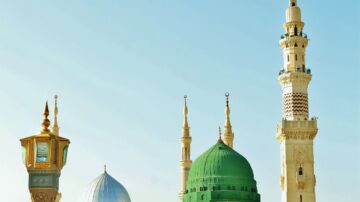{Perform to their completion both the pilgrimage and the `Umrah purely for God’s sake. If you are prevented from doing so, then make whatever offering you can easily afford…} (Al-Baqarah 2:196)
The exact date of the revelation of this verse is not known, except for one report indicating that it was revealed at Al-Hudaybiyah during the sixth year after Hijrah, 628 CE.
Nor can we be precise as to when the pilgrimage was made obligatory in Islam, whether we take that to have been established by this verse or verse 97 of Surah 3 which says:
{Pilgrimage to this House is a duty owed to God by all people who are able to undertake it.} (Aal-Imran 3:97)
In his book Zad al-Maad, Imam Ibn al-Qayyim says that the pilgrimage was instituted during the ninth or tenth year of the Prophet’s migration to Madinah. This is based on the fact that the Prophet himself performed the pilgrimage in 10 AH.
This, however, is not sufficient evidence to support that view. There could have been other reasons that made the Prophet delay going on pilgrimage until the tenth year, especially when we know that he delegated Abu Bakr to head the pilgrimage during the ninth year.
It is also well established that on his return from the campaign of Tabuk, the Prophet intended to go for pilgrimage. However, he later decided not to do so, because non-Muslim Arabs were still doing the pilgrimage to Makkah and he did not wish to join them, not least because some of them would be going round the Kabah naked, as was their custom.
At that point Surah 9, At-Tawbah, which brought the truce with the polytheist Arabs to an end, was revealed and the Prophet dispatched Ali ibn Abi Ţalib to Makkah to proclaim its provisions to the pilgrims. He charged him with the task of announcing at Mina, when all the pilgrims were gathered, that:
“No unbeliever shall enter paradise; no idolater may henceforth perform the pilgrimage; no one may go round the Kabah naked. All treaties signed with God’s Messenger shall run their course.” Accordingly, the Prophet did not go to Makkah for pilgrimage until the Kabah was cleared of all symbols and manifestations of idolatry.
One could point out certain texts as evidence indicating that the pilgrimage was instituted in principle much earlier. Indeed some reports suggest that this took place when the Prophet was still in Makkah, before the migration to Madinah. But this would not hold water.
Nevertheless, verses 26-37 of Surah 22, Al-Hjj, list most of the pilgrimage rituals as they were communicated to the Prophet Abraham. These include:
{When We assigned to Abraham the site of the [Sacred] House, [We said], Do not associate anything as partner with Me. Purify My House for those who will walk around it, and those who will stand before it, and those who will bow down and prostrate themselves in prayer.
Proclaim to all people the duty of pilgrimage. They will come to you on foot and on every kind of fast mount. They will come from every faraway quarter, so that they might experience much that shall be of benefit to them, and that they might extol the name of God on the days appointed [for sacrifice], over whatever heads of cattle He may have provided for them. Eat, then, of such [sacrificed cattle] and feed the unfortunate poor.
Thereafter let them complete the rites prescribed for them, fulfill their vows, and again walk around the Ancient House…
Anyone who honours the symbols set up by God [shows evidence of] God-consciousness in people’s hearts.
You have benefit in them for a term appointed; and in the end their place of sacrifice is near the Ancient House…
The sacrifice of camels We have ordained for you as one of the symbols set up by God, in which there is much good for you. Hence, extol the name of God over them when they are lined up [for sacrifice]; and after they have fallen lifeless to the ground, eat of their meat, and feed the poor who is contented with his lot, as well as the one who is forced to beg. It is to this end that We have made them subservient to your needs, so that you might have cause to be grateful.
Never does their meat or their blood reach God; it is your piety that reaches Him. It is to this end that He has made them subservient to your needs, so that you might glorify God for all the guidance with which He has graced you. Give good news to those who do good.} (Al-Hajj 22: 26-37)
These verses make specific reference to offering animals for sacrifice, walking around the Kabah (tawaf), the rites of ihram (consecration), and the invocation of God’s name, all of which constitute the basic rites of the pilgrimage. The Muslims were addressed with these words as the heirs of Abraham, indicating that the pilgrimage had been instituted at an early stage as part of the legacy of Abraham. The fact that Muslims, for various practical reasons, had not been able to perform the pilgrimage is beside the point.
However, as mentioned earlier in this volume, individual Muslims had been able to perform the pilgrimage since the Kabah was re-instituted as the qiblah in the second year of the Islamic calendar.
By Sayyid Qutb

